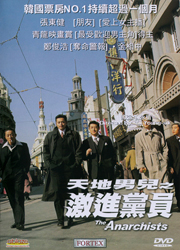
The term "Cinema of Korea" encompasses the motion picture industries of North and South Korea. As with all aspects of Korean life during the past century, the film industry has often been at the mercy of political events, from the late Joseon dynasty to the Korean War to domestic governmental interference. While both countries have relatively robust film industries today, only South Korean films have achieved wide international acclaim. North Korean films tend to portray their communist or revolutionary themes.

Pulgasari is an epic monster film Shin Sang-ok directed and produced in 1985 during his abduction in North Korea. A co-production between North Korea, Japan, and China, it is considered a remake of Bulgasari, a lost 1962 South Korean film that also depicts an eponymous creature from Korean folklore. The ensemble cast includes Chang Sŏnhŭi, Ham Kisŏp, Ri Chongguk, Ri Ingwŏn, and Yu Kyŏngae, with Kenpachiro Satsuma in the title role. Set during the Goryeo dynasty, the film follows a blacksmith's daughter who brings to life a metal-eating monster her late father envisioned to defeat the monarchy.
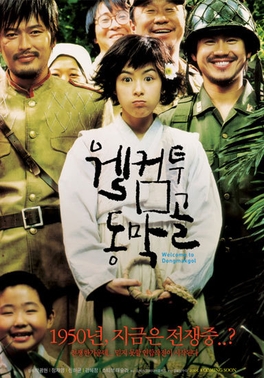
Welcome to Dongmakgol, also known as Battle Ground 625 (UK), is a 2005 South Korean war comedy-drama film. Based on the same-titled long-running stage play by filmmaker/playwright Jang Jin, Park Kwang-hyun's debut film was a commercial and critical success.

The cinema of North Korea began with the division of Korea and has been sustained since then by the ruling Kim dynasty. Kim Il Sung and his successor Kim Jong Il were both cinephiles and sought to produce propaganda films based on the Juche ideology.
Anarchism in China was a strong intellectual force in the reform and revolutionary movements in the early 20th century. In the years before and just after the overthrow of the Qing dynasty Chinese anarchists insisted that a true revolution could not be political, replacing one government with another, but had to overthrow traditional culture and create new social practices, especially in the family. "Anarchism" was translated into Chinese as 無政府主義 literally, "the doctrine of no government."

Anarchism in Korea dates back to the Korean independence movement in Korea under Japanese rule (1910-1945). Korean anarchists federated across their end of the continent, including forming groups on the Japanese mainland and in Manchuria, but their efforts were perforated by regional and world wars.
Anarchism in Japan began to emerge in the late 19th and early 20th centuries, as Western anarchist literature began to be translated into Japanese. It existed throughout the 20th century in various forms, despite repression by the state that became particularly harsh during the two world wars, and it reached its height in the 1920s with organisations such as Kokuren and Zenkoku Jiren.
Anarchism in Vietnam first emerged in the early 20th century, as the Vietnamese started to fight against the French colonial government along with the puppet feudal dynasty for either independence or higher autonomy. Some famous radical figures such as Phan Bội Châu and Nguyễn An Ninh became exposed to strands of anarchism in Japan, China, and France. Anarchism reached its apex in Vietnam during the 1920s, but it soon began to lose its influence with the introduction of Marxism-Leninism and the beginning of the Vietnamese communist movement. In recent years, Anarchism in Vietnam has attracted new adherents.

Freedom Fighter, Lee Hoe-young is a 2010 South Korean historical television series, starring Jung Dong-hwan, Ahn Jae-mo, Lee Ah-yi, Hong Il-kwon and Kwon Oh-joong. Based on the life of Korean independence fighter Lee Hoe-yeong, the drama was made to commemorate the centenary of the Japanese annexation of Korea. Its premiere coincided with the signing of the annexation treaty on August 21, 1910, and the drama aired on KBS1 from August 29 to September 12, 2010 on Saturdays and Sundays at 21:05 for 5 episodes.
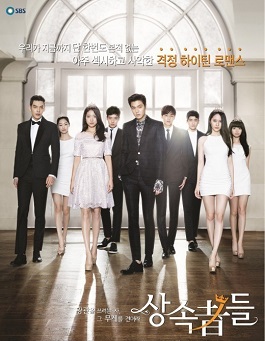
The Heirs, also known as The Inheritors, is a South Korean television series starring Lee Min-ho, Park Shin-hye, and Kim Woo-bin. Written by Kim Eun-sook, the drama is set in a high school populated by the privileged and uber-rich. It aired on SBS from October 9 to December 12, 2013.

Top Star is a 2013 South Korean drama film directed, co-written and produced by veteran actor Park Joong-hoon, in his directorial debut. It stars Uhm Tae-woong as the manager of a top actor who dreams of someday becoming famous like his client, but when a twist of fate grants his wish, his life completely changes. The film premiered at the 18th Busan International Film Festival.
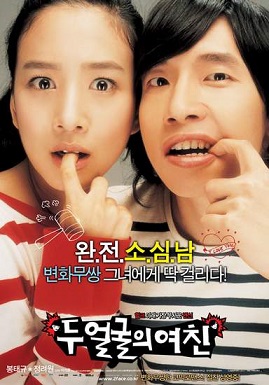
Two Faces of My Girlfriend is a 2007 South Korean romantic comedy film starring Bong Tae-gyu and Jung Ryeo-won.

Assassination is a 2015 South Korean period spy action thriller film co-written and directed by Choi Dong-hoon. The film, mainly set in 1930s Seoul and Shanghai during the Japanese occupation of Korea, depicts a group of Korean resistance fighters' plan to assassinate a highly ranked Japanese officer.
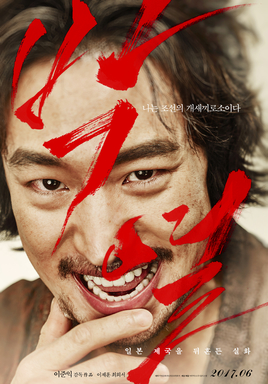
Anarchist from Colony is a 2017 South Korean biographical period drama film directed by Lee Joon-ik about the life of independence activist Park Yeol, with Lee Je-hoon taking on the title role. It premiered in South Korea on June 28, 2017.

The Korean People's Association in Manchuria was a self-governing autonomous prefecture in Manchuria, populated by two million Korean refugees. Following the Japanese occupation of Korea, many Korean anarchists had fled over the border into Manchuria, where they began organising a network of mutual aid for displaced Koreans in the region. Together with some Korean nationalists, they established the KPAM in order to provide food, education and self-defence to its members. Before long, the association found itself under attack by both Korean communists and Japanese imperialists, who assassinated their leadership. The Japanese invasion of Manchuria put an end to the anarchist experiment, with many of its members fleeing to China in order to fight against the Japanese Empire.

Man of Will is a 2017 South Korean historical biographical drama film directed by Lee Won-tae, starring Cho Jin-woong and Song Seung-heon.
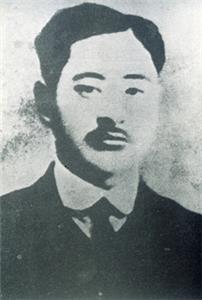
Kim Sang-ok was a Korean independence activist.
Yi Jeong-gyu known by his pen name Woogwan was a Korean anarchist. He spent much of his youth in China, where anarchists were relatively freer than in occupied Korea, and collaborated with not only Chinese anarchists but also with ones from various countries such as Japan, Taiwan, and Russia. He was one of the pioneers of the Korean anarchist movement in the early 1920s, and one of the most prominent Korean anarchists in China of that period.
